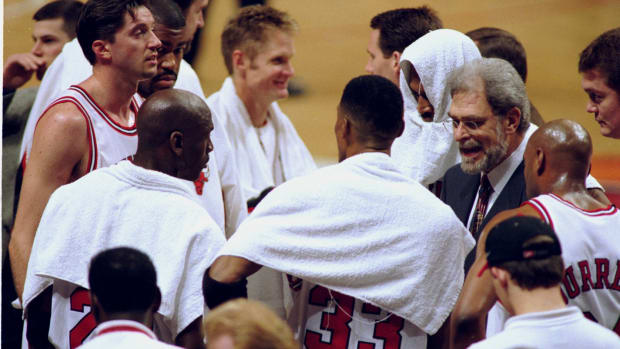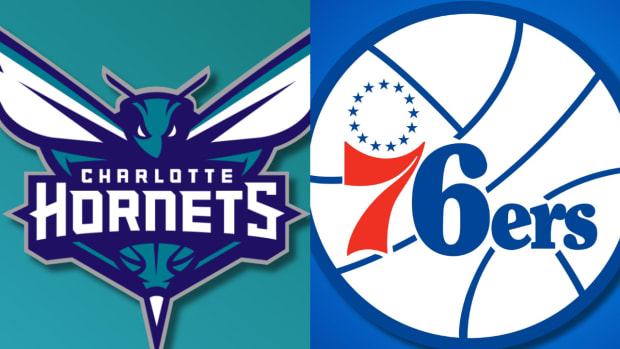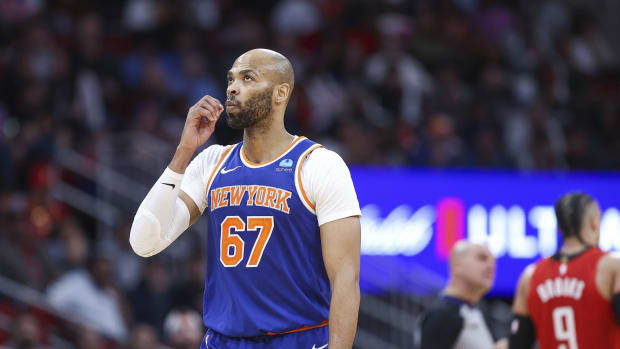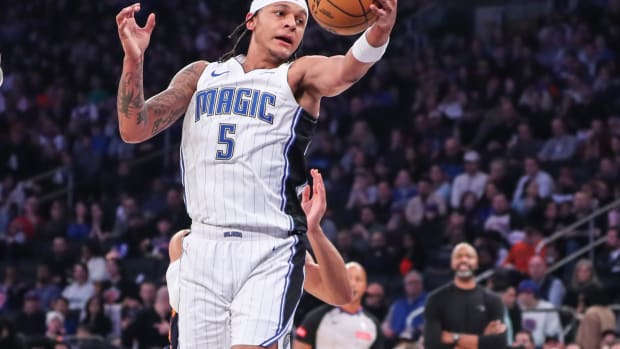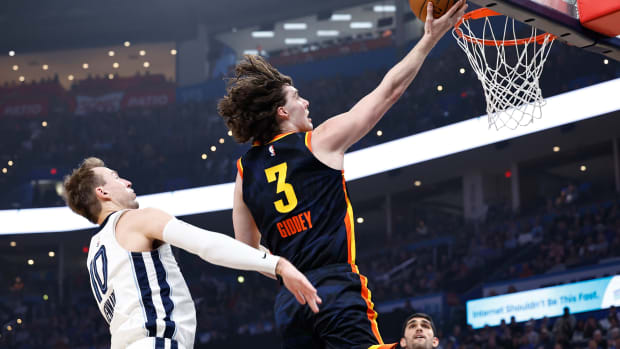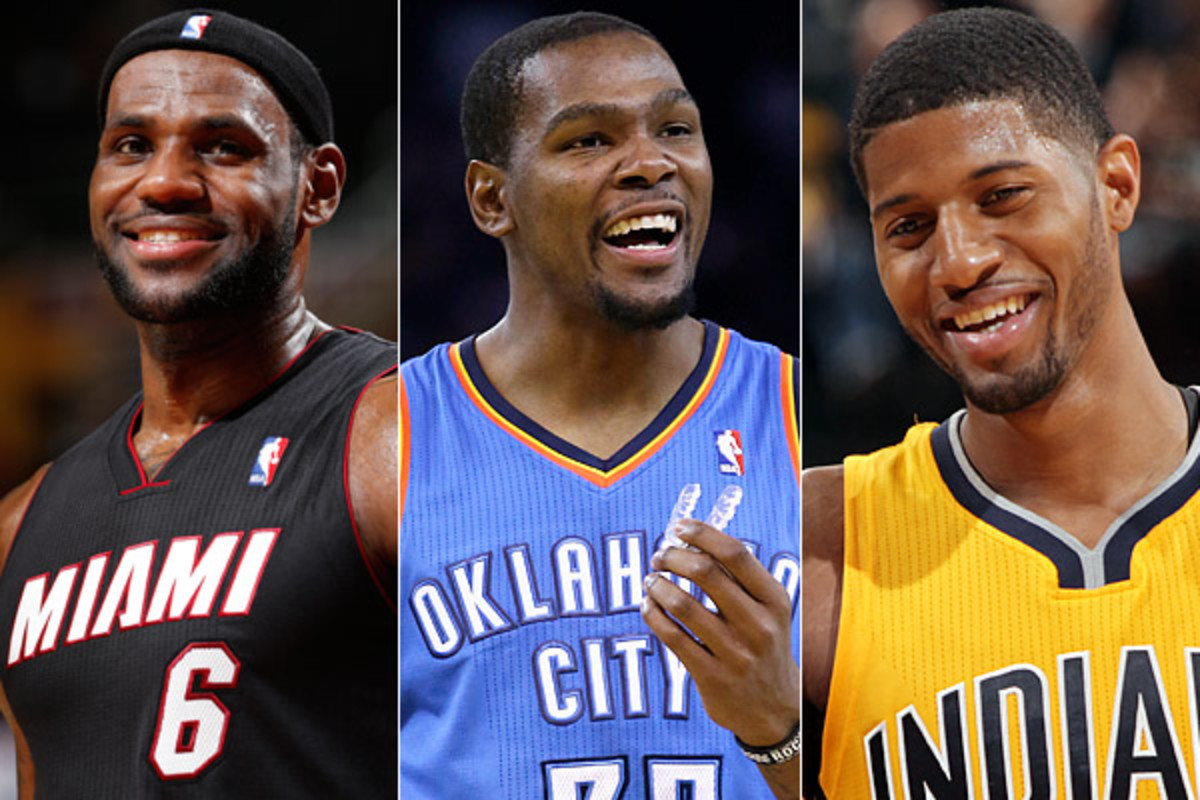
LeBron James leads tight MVP race, more awards at quarter mark of season
The trio of (from left) LeBron James, Kevin Durant and Paul George lead the MVP race. (Getty Images)
With the 2013-14 season at the quarter mark, here are my picks for the league’s top performers. (All stats and records are through Wednesday, Dec. 11.)
MVP
1. LeBron James, Heat
2. Kevin Durant, Thunder
3. Paul George, Pacers
4. Chris Paul, Clippers
5. LaMarcus Aldridge, Blazers
Let's get this out of the way up front: I'm in serious jeopardy of going 0-for-2 on my preseason "bold prediction" that James would win both the MVP and Defensive Player of the Year awards.
That sound you hear from South Beach? That's a high-performance vehicle down-shifting. Dwyane Wade is in and out of the lineup so often that Rotoworld is going to need to add staff just to keep up; Chris Bosh is averaging fewer than 30 minutes for the first time in his career; and even the indestructible James is playing a career-low 35.3 minutes, down from 37.9 last season. Miami's lopsided victories can explain some of this -- 10 of its 16 wins are by double digits, and the garbage time can add up -- but I think it's more accurate to conclude that the Heat are taking a bubble-wrap approach early in the season because the Eastern Conference's middle class is so pathetic. Why ask James to dig into his bag of superhuman tricks against subpar competition? Why agonize over any game between now and March knowing that the Heat can jog backward to the finish line and still end up no worse than the second seed?
This approach is logical, but it could have repercussions for award-voting season. On a per-minute basis, James has been just about the same player he was last season, when he fell only one vote short of becoming the first unanimous MVP in NBA history.
2013-14 LeBron James (per 36 minutes): 25.5 points, 6.7 rebounds, 6.4 assists, 1.3 steals
2012-13 LeBron James (per 36 minutes): 25.5 points, 7.6 rebounds, 6.9 assists, 1.6 steals
The biggest development is that James has taken his shooting numbers -- which were already spectacular -- to a whole new level. He's up across the board: overall (from 56.5 percent to 58.4 percent) three-pointers (40.6 percent to 43.3 percent), two-pointers, free throws (75.3 percent to 78.3 percent), you name it. No one who has played more than 500 minutes has maintained his shooting numbers for a full season. He's not leading the NBA in Player Efficiency Rating (PER) for the seventh consecutive season by accident.
MAHONEY: LeBron right about lack of rivalries in NBA
So what's the problem? A candidacy based on careful fine-tuning and refining might lack a broad appeal to those voters who 1) have already given James four of the last five MVP awards; 2) could be assessing a Miami team that's a cut below the likes of Indiana, San Antonio and Oklahoma City record-wise by the end of the season; and 3) could see dips in James' per-game numbers caused by the reduced playing time. That combination could open the door for Durant, who has been outside knocking for years now, or even players such as George and Paul, who can expect to have strong statistical profiles to complement their teams' winning records.
This time last year, I placed Durant over James as the first-quarter MVP, and if the Thunder's All-Star forward hadn't taken a step back from his incredible 50/40/90 shooting season, he would have been the pick again this season. Instead, he's just barely behind James. It's never been easier to envision Durant's winning this award: Combine a fourth scoring title (he's leading the league with 28.4 points), a top-five PER (he's No. 4), a No. 1 seed in the Western Conference for the Thunder (they are a half-game back) and an "excellent but not historic" season from James and the Heat, and he just might get over the top.
The growing Durant/George debate, for now, is premature, but the simple fact that George is forcing that discussion is a testament to his consistent excellence on both ends of the court. He's nicely positioned as a dark horse should both the Heat and Thunder manage to disappoint. Paul's Clippers have slightly underwhelmed, but not because of him: Like clockwork, he leads the league in assists and is posting a top-five PER again.
Aldridge is on the fringe of this conversation as the prototypical "best player on the biggest surprise team." His career highs of 23.2 points and 10 rebounds have helped make Portland an early challenger for the top seed in the West, but Aldridge will fade from the discussion quickly if the scorching-hot Blazers come down to earth. One thing is clear: Aldridge is a lock to make his third All-Star appearance and, for the first time in his career, he won't be sweating out the selection process as a bubble guy.
Michael Carter-Williams is averaging 17.7 points, 5.8 rebounds, 7.3 assists and 3.1 steals. (Jesse D. Garrabrant/NBAE via Getty Images)
Rookie of the Year
1. Michael Carter-Williams, Sixers
2. Victor Oladipo, Magic
3. Trey Burke, Jazz
First, a quick digression. In August 2011, Andre Drummond surprised the recruiting world by announcing that he would attend UConn rather than spend one more year in the prep ranks. Why mention this? Imagine if the 20-year-old Drummond, who almost certainly would have been the No. 1 pick in 2013 rather than the No. 9 pick in 2012, were averaging 13.1 points, 12.7 rebounds, 1.7 steals and 1.4 blocks and shooting a league-leading 62.7 percent (his current numbers with the Pistons) as a rookie. The hype would be out of this world, and it's worth noting that only two 20-year-olds have matched Drummond's points/rebounds/blocks combination: Shaquille O'Neal and Dwight Howard. In other words, the buzz for Drummond should really be even greater than it is now, and what he's accomplishing as a 20-year-old sophomore is more impressive than anything being done by this year's rookie class, whose top performer is the 22-year-old Carter-Williams.
(By the way, most everything in the previous paragraph also applies to Pelicans forward Anthony Davis. Even though he is sidelined by a broken hand, Davis has composed a beaut of a stat line -- 18.8 points, 10.2 rebounds and league-leading 3.6 blocks -- and his 28.3 PER tops the likes of Durant, Paul and Minnesota's Kevin Love. No 20-year-old has ever posted a PER that high for an entire season, so you can go ahead and invest your life savings in Unibrow stock without a second thought.)
We return from those stratospheric heights to a thin rookie class decimated by injuries to half the top 10: Wizards forward Otto Porter, Suns center Alex Len, 76ers center Nerlens Noel, Jazz guard Burke and Blazers guard C.J. McCollum. Only Burke has returned in an impact-making form, and he's understandably still getting his sea legs after missing the first 12 games with a finger injury. His absence was painful for Jazz fans, who were forced to endure the likes of John Lucas III and Jamaal Tinsley at point guard, but four of Utah's five victories have come with Burke in the lineup. The Michigan product may have been a bit slow out of the gate, but he will be a factor as this race develops.
Carter-Williams and Oladipo are the only two real candidates for the first-quarter Rookie of the Year. Admittedly, the timing here is quite awkward, as Carter-Williams has been sidelined for 10 days with a knee injury and some sort of infection that I've decided not to Google just in case it's really disgusting. It should be acknowledged that Carter-Williams has played only 15 games to Oladipo's 22, but his statistical edges across the board make this a fairly easy choice. The gap is particularly easy to see in the advanced numbers: Carter-Williams leads all rookies with a 19.1 PER, while Oladipo's 12.5 mark is below average.
The minutes issue is a big one to watch with Carter-Williams, especially in light of his current injury. He's averaging 36.7 minutes, by far the most in his class, much like 2012-13 Rookie of the Year Damian Lillard of Portland did last season. That Carter-Williams has been able to maintain such a high PER with such a heavy workload isn't unprecedented, but it is impressive: The last 10 guys to post a PER of at least 19 while averaging 35 minutes or more as rookies are Blake Griffin, Paul, Pau Gasol, Elton Brand, Vince Carter, Tim Duncan, O'Neal, David Robinson, Michael Jordan and Hakeem Olajuwon.
As this season plays out, will Carter-Williams' minutes decrease? Will his efficiency tail off after a debut for the ages and an amazing start to Philadelphia's season? Both? Neither? Those questions will likely determine whether he wins wire-to-wire or gets caught.
Isaiah Thomas has been promoted to the Kings' starting lineup after a hot start off the bench. (Hector Amezcua/Sacramento Bee/MCT via Getty Images)
Sixth Man Award
1. Isaiah Thomas, Kings
2. Manu Ginobili, Spurs
3. Jamal Crawford, Clippers
Last year's Sixth Man voting won't provide much guidance on this one. New York's J.R. Smith, the winner, is off to a brutal start, Jarrett Jack's Cavaliers are struggling and Kevin Martin's been upgraded to a starter in Minnesota. That leaves Crawford, the runner-up, who is more or less still doing his thing with the Clippers, averaging 15.8 points, 2.4 rebounds and 2.5 assists. He's been a relatively steady presence amid injuries to fellow wing players Matt Barnes, J.J. Redick and Reggie Bullock, and his highlight-driven style of play helps keep his name in the mix.
Lakers guard Nick Young (14.3 points) is trying to do his best Crawford impression by stacking up points off the bench with so-so efficiency numbers. That the Lakers' bench not only helped hold things together during Kobe Bryant's absence but also leads the league in scoring could boost Young's appeal, but his whole life got flipped upside down with the Black Mamba's return. It's easier to imagine Young's fading than going the distance.
Although Ginobili's scoring average (10.6 points) suffers from deflation thanks to his smaller minutes allotment (22.9), he's somewhat quietly shooting better than both Crawford and Young while posting an 18.7 PER. He's averaging more assists (4.6) than the two L.A. guards combined, and the Spurs rank second in bench scoring. He's bounced back a bit from a rough shooting season in 2012-13, improving from 42.5 percent to 46.2 percent and raising his three-point percentage from 35.3 to 38.1, and his net rating is a team-best 16.9.
Still, this honor belongs to Thomas, who played so well over the first six weeks that he is poised to disqualify himself from winning the year-end award. Sacramento traded starting point guard Greivis Vasquez this week in order to clear the decks for Thomas, who is averaging 18.3 points and 5.4 assists and shooting 42.1 percent from three-point range. The No. 60 pick in the 2011 draft also has a 23.9 PER, third best among point guards, behind Paul and the Warriors' Stephen Curry.
Thomas didn't have much left to prove in a reserve role, and Kings coach Michael Malone was going to move the 5-foot-9 spark plug into the starting lineup sooner or later. Life will get more difficult for Thomas, who must now find a way to continue to generate his own offense while also keeping DeMarcus Cousins, Rudy Gay and Ben McLemore happy, but you can be sure he's not complaining about the promotion.
GOLLIVER: Grading the Rudy Gay trade
With Thomas out of this race going forward (players must come off the bench in more games than they start to be eligible for the award), this one lacks a clear favorite. Pelicans forward Ryan Anderson, an ideal sixth-man type, missed the first nine games and has since replaced Davis in the starting lineup. Anderson, who finished fifth last season, should be a big factor if everyone gets healthy at the same time in New Orleans. Warriors forward Harrison Barnes faces a similar situation: Once Andre Iguodala comes back and reclaims his starting spot, Barnes could emerge as a contender. Other potential challengers include Rockets guard Jeremy Lin (who is moving closer to a return from a knee injury), Thunder guard Reggie Jackson, Suns forward Markieff Morris, Pistons guard Rodney Stuckey and Mavericks big man DeJuan Blair.
NEXT PAGE: Coach of the Year, Defensive Player of the Year and Most Improved Player.
Terry Stotts (right) has guided Damian Lillard and the Blazers to an 18-4 start. (Sam Forencich/NBAE via Getty Images)
Coach of the Year
1. Terry Stotts, Blazers
2. Frank Vogel, Pacers
3. Jeff Hornacek, Suns
This is always one of the trickiest awards to get a handle on early in the season, as 20-24 games usually aren't enough to establish true tiers. The conference disparity this season just makes it that much more difficult. Ten teams in the West are separated by only four games (ranging from 15-8 to 10-11), and 12 teams in the East are separated by just 4½ games (from 11-11 to 6-15). Who are the sleepers? Who are the true disappointments? Where are the turnaround teams? Who knows.
Stotts and Vogel won their conference Coach of the Month awards thanks to their teams' strong starts. They are both worthy candidates, and the chief reason for selecting Stotts over Vogel might be considered fairly touchy-feely ("No one saw it coming!"). Still, Portland leads the NBA in points per possession by a good margin after finishing 15th last season, relying on three-pointers, an intelligent understanding of their players strengths and weaknesses, and lots of unselfish play. This has been one of the league's most entertaining teams, just as Stotts' strongest advocates (his former boss in Dallas, Rick Carlisle, and Mavericks star Dirk Nowitzki) predicted when he was in the running for the Blazers' job in 2012. To see a vision realized in such a manner is worthy of (early) recognition.
Much of the same can be said for Vogel, and there's a feeling here that his candidacy is more likely than Stotts' to last the entire season. Indiana's top-ranked defense has been historically good, and there's no reason to expect an unraveling: The Pacers topped the league in defense last season, and now they have the benefit of playing against the hapless East as Tanking Season ramps up. Vogel's bunch seems fully motivated to earn home-court advantage in a hypothetical grudge match against the Heat in the conference finals. A lofty win total and top defense would be a powerful one-two punch for Vogel when it comes time for final voting.
At 12-9, a gutted Suns team is in the running for "biggest overachievers." Full credit to Hornacek, who set the tone by developing relationships with some of his younger players while coaching the franchise's entry at the Las Vegas Summer League. The Suns are an annoying, relentless opponent because of their high-pressure defense and an ability to score in transition. The best is yet to come, given general manager Ryan McDonough's accumulation of draft picks, but the current results aren't too shabby.
Indiana's Roy Hibbert (right) has been a force around the basket for the NBA's stingiest defense. (Ron Hoskins/NBAE via Getty Images)
Defensive Player of the Year
1. Roy Hibbert, Pacers
2. Paul George, Pacers
3. Tim Duncan, Spurs
Who says two guys from the same team shouldn't rank 1-2 on an awards ballot?
It would take an unexpected turnaround for James, who finished second to Grizzlies center Marc Gasol last season and then griped about it, to worm his way into this discussion. Indiana has just been too dominant, and its defensive linchpins -- Hibbert and George -- have all the necessary components. Both play for a top-ranked defense, both are All-Stars, both have established defensive reputations, both are capable of highlight plays, both get the benefit of lots of attention during high-profile matchups against top teams and scorers, and both grade out amazingly in on/off numbers. Hibbert's defensive rating is 90 and George's is 91.3. Those are ungodly, and they represent major net differences compared to when either of them leaves the court. To underscore their collective dominance: George ranks No. 1 in defensive win shares and Hibbert ranks No. 2; Hibbert ranks No. 1 in defensive rating and George ranks No. 4.
MAHONEY: How the NBA's best defense got even better
We've seen players chase scoring titles over the years with late-season ball-hogging. I'm imagining a world in which Hibbert and George realize in March that they are clearly the top two candidates for this award and then they decide to chase it full on, smothering weak competitors, pummeling shots back in people's faces, ripping guards before they get across half court, etc. This must happen!
If it does come down to these two, it seems a safe bet that this award's big-man bias will carry Hibbert past George. (Metta World Peace and Gary Payton are the only perimeter players to win since 1989.) Should that happen, I don't think we're likely to hear many complaints.
Settling on a third name is a toss-up, what with the Grizzlies' Gasol injured, the Bulls thrown into injury hell, the Spurs' refusal to play anyone more than 31 minutes a game, the Heat off to a loose (by their standards) start and Milwaukee's Larry Sandersblocking more club punches than shots. Duncan gets the slot as a sign of appreciation for San Antonio's No. 2 ranking in points allowed per possession and his individual defensive rating, which is among the league leaders. James, Oklahoma City's Serge Ibaka, Chicago's Joakim Noah, Golden State's Iguodala and Andrew Bogut, Houston's Dwight Howard and the Clippers' Paul should figure into the trailing pack as this one unfolds.
Michael Beasley (left) has been a valuable contributor in Miami. (Mike Ehrmann/Getty Images)
Most Improved Player
1. Michael Beasley, Heat
2. Anthony Davis, Pelicans
3. Eric Bledsoe, Suns
I guess I'm a sucker for a good "turn your life around" story. Last season, my first-quarter Most Improved Player was Nets big man Andray Blatche, who transformed from an amnesty victim with five years' worth of red flags into a PER darling in a matter of months. Now, Beasley is making a similar leap from down-and-out to super efficient.
In case you ignored the 2012-13 Suns -- and no one could blame you if you did -- Beasley registered more shots than points and posted minus-1.5 win shares, the worst rating in the league. That performance, coupled with off-the-court problems, prompted a contract buyout. Phoenix sent him packing with a sternly worded press release about character standards.
Reborn in a reserve role in Miami, Beasley ranks 15th with a 22.2 PER (more than double his 2012-13 mark) and his offensive rating has soared from 87 to 109. It's hard to be more improved than that. He's kept his nose clean with the Heat, too, which is probably more important than the on-court stuff when you take into account his track record of substance-abuse issues.
JOHNSON: Beasley piecing career back together with Heat
Davis and Bledsoe have dealt with injuries, but let's give them some due for keeping their respective teams in the mix in the loaded West. Even if Davis' improvement was anticipated, you can't argue with the eye-popping results mentioned above. Bledsoe, a logical preseason pick after a summer trade from the Clippers to the Suns promised an expanded role, has delivered by more than doubling his scoring and doubling his assists. His 21 PER is easily a career high and sixth among point guards. Bledsoe's teammate Morris has made big strides this season, too.
O.J. Mayo
Jordan Crawford
Spencer Hawes
Tony Wroten
Miles Plumlee




































